AWARE magazine
GARRETT-EVANGELICAL AND THE CHILDREN'S DEFENSE FUND INVEST IN CDF FREEDOM SCHOOLS (PAGE



Winter 2023
3 | Presidential Perspective
4 | Feature: Nurturing Present & Future
5 | Freedom Schools: An Essential Theological Task
8 | Chicago Church Awarded Grant to Start Freedom School
10 | Ethics for Child Thriving in a Digital Age
12 | Supporting the Garrett-Evanston Freedom School Is a "Perfect Match" for the Wilbur Family
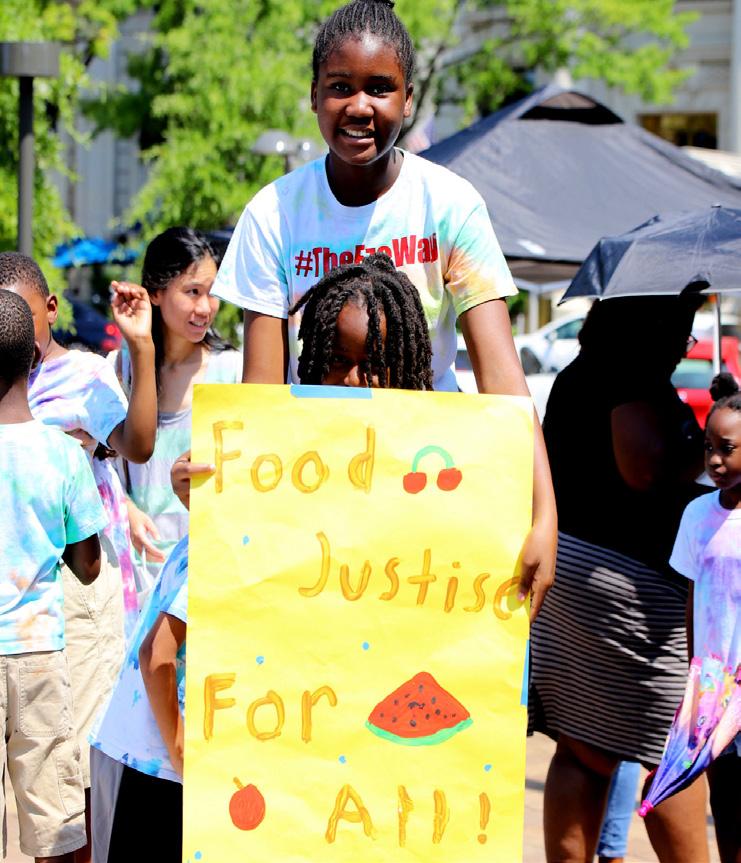
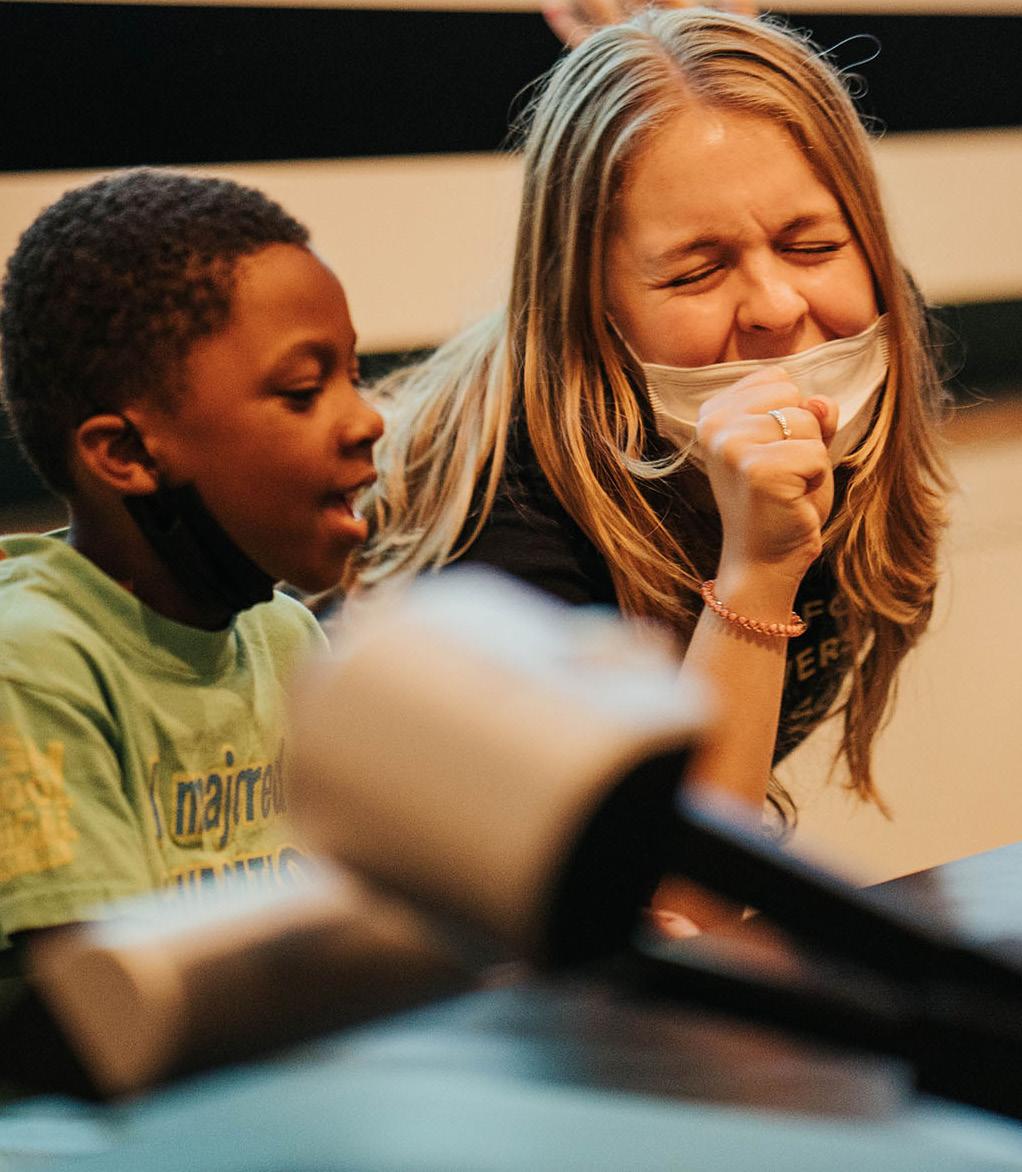
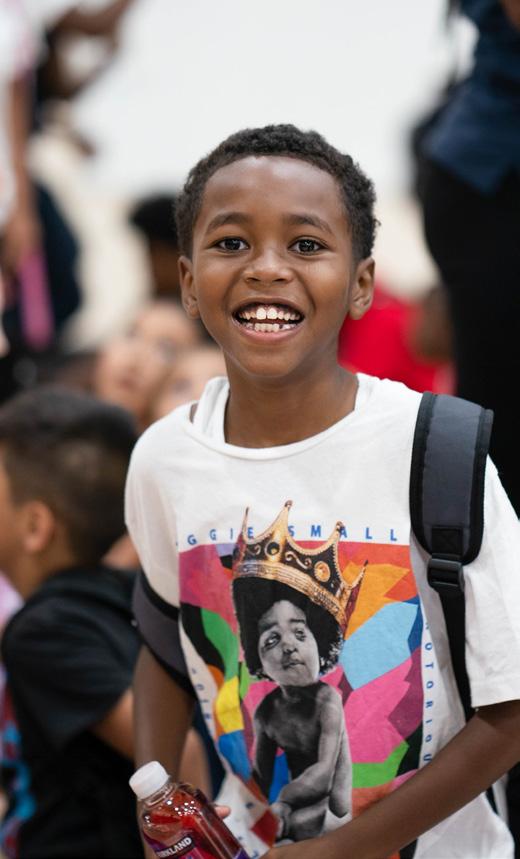
13 | Leading for Liberation
14| Cherished Mentor and Professor, Douglas E. Wingeier, Dies at 92
15 | Alum News
Awaremagazine is published quarterly by the offices of development and marketing and communications for alums and friends of Garrett-Evangelical Theological Seminary, a graduate school of theology related to The United Methodist Church with an ecumenical outreach.
Feedback and comments for the Aware Editorial Board should be directed to seminary.relations@garrett.edu.
PRESIDENT
Javier A. Viera
EDITORIAL BOARD
Mary Bowmann Arents
Katharine Duke
Joseph R. Emmick
Maudette Watley GUEST
Myrna Turner

An enormous mural by Argentinian artist Franco Muñoz adorns the side of a bodega in the city and province of San Juan, Argentina. It is striking for several reasons. The first is the burst of color that jumps out from the center of the mural amidst a monotonous surrounding landscape, as well as the monochrome cityscape in the background of the mural itself. Muñoz said he wanted that burst of color to communicate joy and radiance in an otherwise drab reality. The other striking feature of the mural is the central image—a boy (it’s hard to tell how old) sporting a multi-colored hoodie, his eyes appearing to water or tear, and wearing a light blue pandemic-era face mask, featuring a huge smile, covering his mouth and nose. The contrast between the worried, almost fearful, teary-eyed look in the boy’s eyes with the huge smile on the mask is both stark and deceptive.
I have often thought about this mural as we’ve planned the work of our partnership with the Children’s Defense Fund (CDF), which you’ll learn more about in this issue of Aware. This partnership seeks to put the well-being and thriving of children at the center of our theological project. It assumes that communities that focus on the formation and flourishing of their children—physically, spiritually, economically, and educationally—are communities whose priorities and values are well-grounded. Yet, the mural subtly exposes that we too often fail to see the truth our children live. We convince ourselves that they are fine, choosing to see their “smiles” while failing to look beyond the “masks” we ask them to put on, missing their pain, their tears, their fear, their vulnerability, their fragility, their uncertainty, even in our safest and most secure communities. Alas, too often our churches have been the sites of their pain or the sites where their pain is masked.
Jesus was exceptionally clear when he said, “Let the children come to me, and do not hinder them, for the kingdom of heaven belongs to such as these.” If we are to be faithful followers of Christ, we must take those words seriously. As the Church in the United States continues to fracture and decline over endless differences, I would hope that the wellbeing and thriving of children is something that might bring us together in seeking to be faithful to Jesus’s call. In this sense, the research findings of our partners at the CDF serve as a clarion call.
• Children make up 22 percent plus of our national population, and the majority are children of color.
• One in seven children live in poverty. One in four black children and one in five Hispanic and Native Indian/ Alaskan children live in poverty.
• One in seven children are food insecure, meaning they live in households where not everyone has enough to eat.
• Nearly five million children have no health insurance.
• More than 80 percent of two-child families pay more for childcare than for rent.
• Gun violence was the leading cause of death for children and teens ages 1-19 in 2018, surpassing motor vehicle accidents for the first time, and in 2019, 3,371 children and teens were killed with guns—one every two hours and 36 minutes.
I could go on with endless statistics about the state of this nation’s children. Needless to say, in order to care for our children spiritually, in order to “pass down the faith,” in order for the church to be a meaningful space of growth, inspiration, values, moral formation, community, and hope, it must also be a community that meets and addresses the real needs and challenges our children face. We cannot expect to resonate with our children’s longings and dreams if we don’t acknowledge and live with the realities most of our children face. This is why we are placing the well-being and thriving of children at the center of our theological project. The state of our children’s well-being is a measure of our effectiveness and faithfulness. As Jesus said, “…do not hinder them…” Instead, the Church needs to be their fiercest advocate, the place where our children know the unconditional love and grace of God and of God’s people. This is deeply spiritual and theological work that someone at that bodega in San Juan, Argentina understood so well. On the front of the bodega, around the corner from that enormous mural of the boy wearing a hoodie and face mask, these words were spray painted on the front columns of the building: “I love you just the way you are.” “I love you just because.” “Don’t do anything without love.” “What would you do without fear?”
To some, it might look like a random act of vandalism. To me, they read like words from God. They are words of love, promise, and searching our children need to hear and words we as a seminary need to boldly live out!
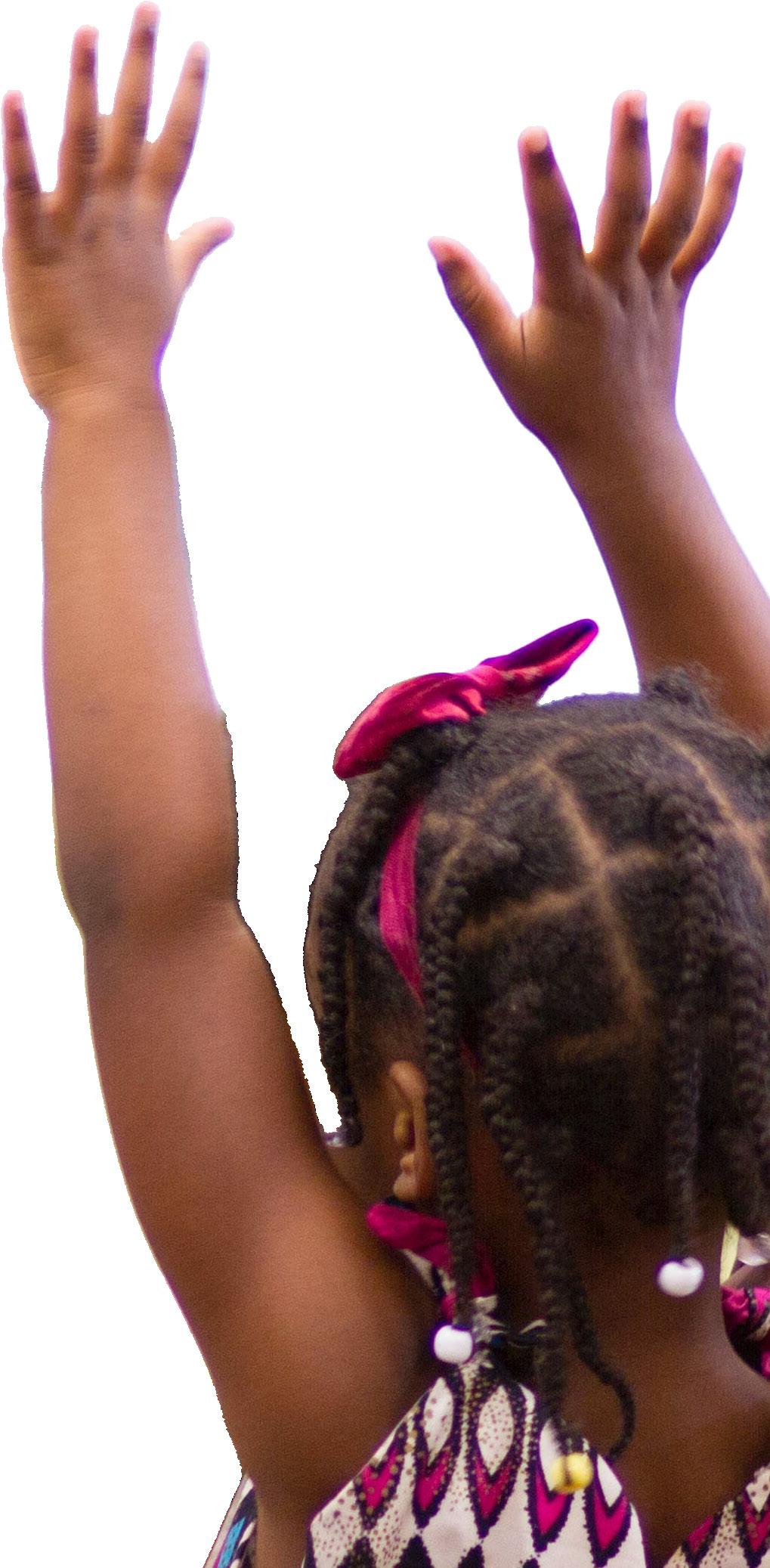
Garrett-Evangelical and The Children's Defense Fund
Partner for a Healed World

In my reading related to child advocacy over the last decade, I have found many quotes I love. My favorite quote is: “I’m not a mother, but I have children.” This quote is from Mercy Oduyoye, a Ghanaian Methodist woman, acknowledged most often as the “mother of African women’s theologies.” When I first read these words in Marcia Bunge’s book, The Child in Christian Thought, they resonated with me. The quote expressed my own philosophy and theology about caring for children, and it echoes phrases I have often expressed.
After seminary, I took a ministry position at Reveille UMC Church in Richmond, Virginia as the minister of age-level ministries and mission. That meant I was responsible for children and youth ministries. On trips, like retreats and mission trips, I would often be in public places with a lot of children or youth surrounding me. On many occasions, someone would look at the children closest to me and say, “Are those your children?” And I remember that the first time I was asked that, I did not hesitate. I looked around and said, with a gesture, “They are all my children.” And I meant that!
At that time and still today, I take seriously the vows I make at the baptism of a child. In the UM baptismal liturgy, the congregation is asked:
“Will you nurture one another in the Christian faith and life and include these persons (this child or these children) now before you in your care?

As the congregation responds:
“With God’s help we will proclaim the good news and live according to the example of Christ. We will surround these persons (children) with a community of love and forgiveness, that they may grow in their service to others. We will pray for them, that they may be true disciples who walk in the way that leads to life” (From The United Methodist Hymnal).
By Dr. Virginia A. Lee Associate Professor of Christian Education and Director of Deacon Studies

I have a responsibility for them; they are children of the community.
As many of my students know and get tired of hearing me say, our children are not the church of tomorrow; they are the church of today! While adults certainly have things to teach and share with children, children also have gifts and graces to share with the church. But it is not just the children in my church or my denomination or other denominations for whom I am responsible, it is all children. All children are children of God, created in the image of God, and therefore, are my responsibility. ALL children are our children!
In my first teaching position in theological education, I often used information from a research project conducted by Search Institute on “Effective Christian Education.” While acknowledging that it was hard to quantify faith, they measured mature faith along vertical and horizontal axes. The vertical axis related to actions that reflected “love of God,” and the horizontal axis related to actions that reflected “love of neighbor.” Mature faith was faith that reflected both love of God and love of neighbor. (This scriptural reference is from Matthew 12:30-31.) This research resonated with me because I had come to recognize in my graduate work and in my ministry as an educator in a congregation that my theology of Christian education was providing opportunities for persons to love God and love neighbor, actions that are foundational for United Methodist theology.
If you review baptismal vows and ordination vows, you will see that they also reflect an orientation to loving God and loving neighbor. As a deacon, one of my roles is to help persons live out their baptismal vows to love God and love neighbor. All persons are called to ministry by virtue of their baptismal vows, not just clergy. For the last seven years, one of the ways that I live out my “love of God and neighbor” is through my work with the Children’s Defense Fund (CDF) and with the Garrett-Evanston CDF Freedom Schools® Program.
One of my favorite books is Mountains Beyond Mountains: The Quest of Dr. Paul Farmer, A Man Who Would Cure the World, written by Tracy Kidder. In this book, Kidder shares a Haitian proverb that Farmer often quoted, “God gives…but does not share.” Farmer explains that the proverb means that God has abundantly provided all that we need, but the distribution of these abundant material and human resources is a human responsibility.
As Shannon Daley-Harris wrote in her chapter of Let Your Light Shine: Mobilizing for Justice with Children and Youth:
"…put simply, we have a profound human and moral crisis that demands the resources, engagement, and commitment of people of faith in every faith tradition. Transforming our nation’s priorities and launching a movement to ensure that we leave no child behind requires theologically grounded and practically equipped religious leaders and members to mobilize the vast resources, infrastructure, and moral
One of the ways that we can “love our neighbors” is to share our resources in ways that create a community where the well-being of all children is prioritized, and all children thrive. One of the ways that GarrettEvangelical has chosen to “love God and love our neighbors” is through the Garrett-Evanston CDF Freedom Schools® Program.

The Garrett-Evanston CDF Freedom Schools® Program is a six-week summer literacy program where scholars (children) learn to fall in love with reading through culturally relevant books and curriculum. Their teachers, called servant leader interns (SLI), are college or graduate students between the ages of 18 and 30. The program provides leadership development skills for them and the opportunity to learn about the community from some of the experts on the topic – the scholars.

As executive directors of the Garrett-Evanston CDF Freedom Schools® Program, Dr. Reginald Blount and I learned about the community of Evanston and met with numerous community leaders. We learned that the Fifth Ward was an underserved area of the city, and we learned that the local school system, District 65, was dealing with a significant achievement gap. We also learned that there were assets available and partners in the community who wanted to collaborate. The name of our program highlights the partnership between the city of Evanston, numerous faith communities, municipal leaders, and GarrettEvangelical.
During the first year of the program, we had the great pleasure of seeing children thrive in the program. Children who entered the doors believing that they could not read or learn, quickly learned that was not true. They learned critical thinking skills and how they could effect change. They learned that they had agency and could make a difference in themselves, their families, their schools, their neighborhoods, and the world. They learned to fall in love with reading, and the majority of the children maintained or increased their reading skills during the summer.
If you want to learn more about Children’s Defense Fund and the Garrett-Evanston CDF Freedom Schools® program, I have several suggestions:
• Read the rest of the related articles in this edition of Aware.
• Read the book Blount and I edited, Let Your Light Shine: Educating for Justice with Children and Youth, which gives more information about CDF, the Proctor Institute, and the Garrett-Evanston CDF Freedom Schools® Program.
• Contact me at Garrett-Evangelical. I love to talk about CDF Freedom Schools.®
Invest with us in child advocacy and well-being! Contact Joe Emmick, vice president for development, at Joe.Emmick@Garrett.edu or 847.866.3923 to make a gift today.
Why is it important for a seminary to engage in a partnership with an organization like the Children’s Defense Fund?
A partnership allows us to make an impact in what might not be fully achieved individually. Mission and alignment are also key. GarrettEvangelical and CDF have a long history of collaboration, including the Garrett-Evanston CDF Freedom School®, the Samuel DeWitt Proctor Institute for Child Advocacy Ministry, and the Dale P. Andrews Freedom Seminary. This partnership is another expression of our collective commitments to see human flourishing through the liberation and well-being of children.

How does the Garrett-CDF partnership reflect Garrett-Evangelical’s mission to train courageous leaders for the “thriving of the church and the healing of the world”?
Garrett-Evangelical has taken seriously the training of those called and committed to centering the thriving of children, youth, and young adults since its beginnings. It started with a Methodist laywoman, Lucy Rider Meyer, who founded The Chicago Training School in the late 1800’s to train women, who were eventually recognized as deaconesses, to provide health and social services for the poor, the elderly, and children. That commitment to train those called and committed to centering the thriving of children, youth, and young adults continues. During the course of 25 years, we have had more than 12 dissertations written that centered the thriving of children, youth, and young adults that includes scholars Dr. Evelyn Parker, Dr. Dori Baker, Dr. Carmichael Crutchfield, Dr. Denise Janssen, Dr. Tanya Eustace Campen, Dr. Hesung Hwang, and me. This partnership takes us to a new level and expands our historic commitments to the well-being and flourishing of young people in amazing ways.

This article was originally published by the Northern Illinois Conference, August 19, 2022.
Children and youth in Chicago’s Chatham neighborhood on the city's South Side will soon get additional educational support to give them a head start thanks to a new CDF Freedom School® opening at St. Mark United Methodist Church.
On Sunday, August 14, St. Mark UMC announced the church received a $350,000 renewable yearly grant for three years from the Illinois State Board of Education to start a CDF Freedom School® as a continued effort to provide social and economic equity through unique learning opportunities.
“We are honored to receive this grant, but we are more excited about the impact it’s going to have on the children and our community,” said Reverend P. Devon Brown, senior pastor at St. Mark. “The CDF Freedom School® teaches the students reading, writing, and arithmetic in the context of their culture and history, which will build self-esteem and help raise competent young people to grow into adults who contribute to the community.”

In April 2022, the state of Illinois announced a $17 million grant to build the first state-funded network of CDF Freedom Schools® in the country. The schools date back to the 1960s when volunteers traveled to Mississippi to teach Black students how to read and write, along with lessons on constitutional rights and African American history.


Chicago 6th Ward Alderman Roderick T. Sawyer said he’s pleased the state chose St. Mark for the grant and believes the CDF Freedom School® will be vital to the community.
“Any educational institution like this will uplift the citizens in this community, and l think it will be enlightening to the youth, their parents, and community members who get involved,” said Sawyer. “We have to make sure people know they matter and that they have the rights and privileges of every other

student, and I think this CDF Freedom School® will make that happen.”
In 1995, Marian Wright Edelman, civil rights activist and founder of the Children’s Defense Fund (CDF), took the name and founded the CDF Freedom School® Program. CDF's mission is to "ensure every child a healthy start, a head start, a fair start, a safe start, and a moral start in life, and a successful passage to adulthood with the help of caring families and communities."
Reverend Pamela Pirtle, who is serving on staff at St. Mark, first introduced the idea of starting a CDF Freedom School Center and brought together a team to work on applying for the Phillip Jackson Freedom School grant that is part of the state’s Education and Workforce Equity Act enacted last March.
"We know the rich history of this program not only changes children's lives, but it also positively impacts communities," said Pirtle. "We can't wait to welcome the scholars, as they're called under the program, and we can’t wait to see these young people be inspired with hope and self-confidence as the literacy gap is closed."
According to the CDF Freedom Schools® website, the program provides summer and after-school enrichment through a research-based and multicultural program model that supports K-12 scholars and their families through five essential components:
character-building enrichment, parent and family involvement, intergenerational servant leadership development, civic engagement, and nutrition, health and mental health.
Since 1995, CDF said the program has educated more than 150,000 children (K–12) and trained more than 17,000 young adults and child advocates on the CDF Freedom Schools® model. About five CDF Freedom Schools® exist in Chicago and more than 200 across the country, according to Jon Hale, associate professor of education policy, organization and leadership at the University of Illinois Urbana-Champaign and author of the 2016 book The Freedom Schools: Student Activists in the Mississippi Civil Rights Movement (New York: Columbia University Press).
“Illinois will have the largest Freedom School network in the county with this grant program,” said Hale, who added this kind of funding is rare as many states are cutting education funding. “Hopefully, this inspires more state support since this type of education is critically important. The after-school program supports what’s being taught in schools, and the six-week summer program fills that summer learning gap.” Hale, who consulted with St. Mark, says CDF Freedom Schools® provide tremendous support for young students by providing high-quality education, excellent teaching, and connections to mentors. He says this education is needed now more than ever.
"They (CDF Freedom Schools®) have become so much more important because COVID-19 has devastated public education in terms of funding, displacing students and teachers, and increasing privatization,” Hale told the Illinois News Bureau.

Reverend Arlene Christopherson, NIC assistant to the bishop and director of connectional ministries, praised St. Mark for receiving this grant and said the church is up to the challenge.
“I know from my time working with you that this church invests in youth and children from your martial arts program, youth choir, youth groups, Sunday school; it’s in your DNA,” Christopherson told the congregation. “In this era in our society, our youth need more support, guidance, and opportunities than ever before. We need the moral grounding that you can give through this school.”
with Reverend P. Devon Brown (G-ETS 1989) & Reverend Pamela Pirtle (G-ETS 2015)
How is the launch of the CDF Freedom School® going? What are you looking forward to in 2023?
Reverend Pirtle said: "The St. Mark CDF Freedom School® afterschool program is in the first few months of its opening, and things are going very well. The relationships being forged with our local schools, administrators, teachers, parents, and students (scholars) has been nothing short of amazing. We look forward to the expansion of our program in June when we will provide full-day quality, no-cost summer curriculum and enrichment programming that will improve critical thinking, academic development, creativity, and the love of reading."
What is the significance of a church hosting a CDF Freedom School®?
Reverend Brown said: “The CDF Freedom School® teaches students the joy of reading and learning in the context of their culture and history, which will build self-esteem and help raise competent young people to grow into adults who contribute to the community. The church must be involved in the shaping of young people to be productive members of society.”

What have the children and youth taught you about theologies of well-being for young people?
Reverend Pirtle said: "Looking into the eyes of our young scholars has taught me that we as a church must live out our commitment to be the body of Christ on earth. This CDF Freedom School® meets the needs of our scholars, families, and community through the gospel of love that moves us to action. We are our brothers’ and sisters’ keeper and are responsible for their well-being."
The pervasiveness of digital technology marks a major generational shift in the lives of children and youth. Depending on your age, you might recall hearing admonitions that the television would melt your brain or feeling the thrill of a cordless phone that could be used behind the privacy of your bedroom door. Those were significant changes—exposure to a variety of cultural representations on television and more privacy in communications. For today’s children and youth, these changes and more are in the palm of their hands, available 24/7.
As adults, we often do not know how to respond to rapid technological change in our own lives, let alone for children and youth. I share Felicia Wu Song's sentiments from her new book Restless Devices when she writes: "While we are so grateful and even love so much of what we get from our digital technologies, we often feel frustrated, harassed, and exhausted by them. And we don't know what to do about it." Unfortunately, extreme reactions can dominate, even though, we do not need to choose between awe or demise, acquiesce or abstinence. Instead, communities can put the needs of children at the center of our concerns, critically engage technological shifts, and develop a vision grounded in Christian values for the kind of tech life we want.
I have the privilege of annually working with congregations across North America. Over a decade ago, I noticed adults and youth increasingly questioning how digital technology changed where they got information, how they met people, and what they shared publicly about themselves. At the time, none of us could predict the rise of social media or the ubiquity of artificial intelligence. It feels like I am always playing catch-up; I’ve learned focusing on the next popular tech is a losing battle. Instead, we need to develop a communal, ethical approach that is flexible, creative, and sustainable no matter the next design or user concern that arises.
By Dr. Kate Ott Jerre and Mary Joy Stead Professor of Christian Social Ethics
As a parent, youth minister, and researcher, I know that kids develop healthier relationships, grounded in their faith values, when they are given access to accurate information, practice putting their values into action in everyday situations, and have supportive, trustworthy adults to discern and reflect with them. These factors are not magic; they are carefully cultivated, researchbacked, and consistency dependent. Raising morally grounded kids is a spiritual practice of accompaniment. Fear causes adults to restrict information, especially related to sexuality and technology. It can also lead to restricting the opportunities kids have to practice putting their values into action. Whether it is fear of failure or a desire for safety, many adults put children into theological categories of little devils to be controlled or innocent angels to be protected.
A theology of child thriving related to digital technology and healthy relationships requires we shift our theological vision of children, commit to raising levels of relational and digital literacy, and cultivate communities of care and moral discernment to support this work.
For decades, womanist, feminist, queer, and postcolonial theologians have struggled to shift the primary subject in theology to individuals and communities who look like them or who experience the on-going, systematic precarity of social oppression. Similarly, there is a dismissal of children’s full personhood because of age, cognition, or physical ability. A movement called “childist studies” (modeled on intersectional, advocacy terms like feminist and anti-racist) locates children not on the margins or as an afterthought, but as central to rigorous scholarly, policy, and everyday change. This is a shift GarrettEvangelical has committed to in its work with CDF Freedom Schools® and through its relationship with the Children’s Defense Fund.

A theology of child thriving requires a shift away from a Euro American, philosophical ideal of an independent, experienced, rationally calculating, adult male as the “best” decision maker and representative of the divine. Childist theology values interdependence, affirms diverse and affective ways of knowing, and seeks wisdom from across age spans. Jesus advocates a childist model in Mark 10 and Matthew 19. Doing theology with and from the point of view of children can be messy as Joyce Mercer reminds us in her text Welcoming Children. Thankfully, children’s creative, relational, and interdependent ways of being in the world align well with the networked, diverse, and responsive nature of digital technology, as noted in an “Ecclesiology of ‘Do not stop them.’” This means we can take a cue from childist ethics as we approach moral responses to digital technology.
Ethics is less a calculation and more an act of creativity and relational response, a practice engaged over a lifetime whether one is a student, pastor, business leader, technologist, nurse, or professor. For Christians committed to a more just and inclusive world, imaginative and serious ethical response to the growth of technology requires we increase our digital literacy. Lists of digital dos and don’ts quickly become outdated. For example, rules about screen time are blunt instruments (and a losing battle) if we don’t consider the purpose or content being engaged. Has your faith community had conversations about informational literacy, the way algorithms work, or how designers use behavioral psychology to keep us online? No worries, my congregation hasn’t either, and I’m the author of Christian Ethics in a Digital Society that explores these issues. We can’t accompany children in ethical responses to technology if we don’t know the basics of how it works.

A great starting point for considering technology and theology might be a teen and adult reading group of John Dyer’s book From the Garden to the City or a viewing party of the Netflix documentary The Social Dilemma. Both increase digital literacy and model how to ask critical questions about the effects of technological design and use. We need to commit to collectively exploring how digital technology directly impacts who we are and what we do, ushering in abundant possibilities and indelibly altering how we form relationships and community.
No matter the resource, the approach is what matters most. Start by believing in children’s ethical abilities and invite their inquisitiveness. Engage in mutual discernment to build digital literacy muscles. Talk openly and honestly about the positives, negatives, and unknowns of how digital technology has changed relationships and include discussions of sexual relationships (don’t leave kids to figure this out on their own; use the youth study guide in Sex, Tech, and Faith).
Most importantly, bring your values to the discussion! What does love of neighbor look like online? How do we recognize the imago dei in ourselves and others as we post photos and add comments?
Where is Christ present in VR when two or more are gathered? How do my interactions with robots and AI morally shape me?
In 2023, the Stead Center launches a childist ethics campaign: the Arts of Ethics! We invite children and youth to submit creative works that depict how they describe ethics in the form of drawings, videos, stories, poetry, music, and so on. This is one way to leverage technological engagement for communal conversations between children and adults about ethics. Find out more at SteadCenter.com.
When Jay and Billie Wilbur learned of the capital campaign to fund the Rueben P. Job Endowed Chair of Spiritual Formation at Garrett-Evangelical Theological Seminary, they decided to act. “Helping to fully fund that position presented our family with the opportunity to make a lasting difference in the life of the students and The United Methodist Church,” said Billie Wilbur.
Since that gift in 2012, the Wilburs have continued to make a difference at Garrett-Evangelical. Billie joined the Board of Trustees in 2016 and served on the development committee. The family also supports the seminary’s child advocacy work and helped fund the Garrett-Evanston Children’s Defense Fund Freedom Schools® program, a six-week summer literacy program for third to eighth graders in Evanston.

“Poor children, particularly those from communities of color, do not have access to enough resources for enrichment,” Billie said, explaining why this program appealed to her. “After school and summer programs are

important aspects of learning, and Freedom Schools offer those opportunities to children who need them the most.”
Billie and her husband have long supported child advocacy work. In addition to funding the CDF Freedom Schools® at Garrett-Evangelical, the couple supports The Covenant House, which provides shelter to LGBTQ, pregnant, and young adults facing homelessness. They are also longtime supporters of The Methodist Children’s Home, and they recently began supporting Imagine Worldwide, a nonprofit organization dedicated to bringing literacy and numeracy proficiency to children around the world. “Supporting the collaboration between CDF and Garrett-Evangelical felt like a perfect match for us,” Billie said.
Garrett-Evangelical’s open and affirming environment for all students and its emphasis on spiritual formation are two of the reasons the Wilburs were drawn to Garrett-Evangelical. They also appreciate the education GarrettEvangelical provides.
“As United Methodists in a rural setting, we saw how important seminary-educated pastors and staff are to the life of a congregation,” Billie said. “The opportunity to support programs at Garrett-Evangelical gives us the ability to impact our faith community for generations.”


In the spring of 2018, I knew if I wanted to stay in Evanston for the summer, I would need a job. So, I asked Reverend. Dr. Reginald Blount, my advisor, about opportunities to work with children and education. Unbeknownst to me, he serves as an executive director of the Garrett-Evanston CDF Freedom Schools®. They were looking to hire servant leader interns (SLIs) to teach a group of elementary or middle school students for six weeks the upcoming summer. I had never heard of CDF Freedom Schools® nor the Children Defense Fund (CDF), but I applied for the job.
After being hired, I was required to attend National Training in Knoxville, Tennessee. Joining thousands of young adults from across the United States to learn how to facilitate the CDF Freedom Schools® model was electrifying and life-changing. My first national training experience was life-changing because I caught “the Freedom School bug.”
During the last five years, my commitment evolved. In the summer of 2019, I served as the site coordinator at the Garrett-Evanston CDF Freedom School® and was responsible for hiring SLIs, coordinating on-site training, processing applications for each student (affectionately called “Scholars”), managing dayto-day operations, and supporting SLIs with any curricular needs.
When the Covid-19 Pandemic hit, the executive directors chose to spend this time doing an assessment on the progress and impact of the CDF Freedom School® throughout its first five years. This research project involved interviewing parents, community partners, and former SLIs. As a member of this research team, I learned about the many ways this program has changed lives, particularly the lives of children and families. After taking a full-time job at the Wabash Center for Teaching and Learning in Theology and Religion, I had to shift my involvement with the program. For the last year, I have worked as a consultant to the GarrettEvanston CDF Freedom School® to re-establish relationships with our community partners and served as a liaison to the District 65 Board of Education. In March, I will attend my first CDF/Garrett Partnership Advisory Board meeting as a board member.
Serving the Garrett-Evanston CDF Freedom Schools® has been rewarding, especially seeing the growth and development in the scholars. Some start out shy but leave with confidence in their voices as leaders. Others begin the program filled with confidence in their literacy skills but learn through our “step up, step back” community covenant that they do not have to speak first or be most heard in the classroom. Our scholars learn how to learn together, encourage one another, resolve conflict, and thrive as a CDF Freedom School® community.
There were also challenges. It was challenging to hear about some of the personal hardships our scholars faced due to issues within their family or community. When I was site coordinator, I ensured the SLIs practiced active listening, had compassion, maintained a clean space, and kept our scholars safe. We practiced forms of pedagogy and classroom management techniques that underscored the importance of EMPSS (emotional, mental, physical, and spiritual safety).
My Freedom Schools experiences enhanced my theological education by introducing me to a Christianinfluenced educational paradigm that was successfully implemented in ecclesial, educational, community-based, and correctional facility contexts. I learned how to embody liberative teaching practices to facilitate a culturally informed curriculum that helped scholars embrace many of the same virtues I was preaching about in youth church on Sunday. CDF Freedom Schools® showed me how to approach Christian education more creatively and intentionally. In summary, my CDF Freedom Schools® experience made me a better educator, pastor, and child advocate.
Gina A.S. Robinson is a native of Georgia, who has lived in Evanston for five years. She currently works as associate director for the Wabash Center for Teaching in Theology and Religion. She will receive her Ph.D. in Christian Education from Garrett-Evangelical this May.

Reverend Dr. Douglas E. Wingeier passed away on December 19, 2022, at the age of 92. Wingeier was a retired clergy member of the Michigan Annual Conference of The United Methodist Church. After serving several churches in the United States, Wingeier spent eight years as a United Methodist missionary teaching in English and Chinese at Trinity Theological College in Singapore.
In 1970, Wingeier joined the faculty of Evangelical Theological Seminary in Naperville, Illinois. When ETS merged with Garrett Theological Seminary in 1974, Wingeier joined the Garrett-Evangelical Theological Seminary faculty as an esteemed member until his retirement in 1997. He taught Christian Education and Practical Theology, and directed the Doctor of Ministry, Continuing Education, Field Education, and Summer School programs.
Wingeier spent sabbaticals teaching in Samoa, Korea, Malaysia, Indonesia, Central America, Haiti, Palestine, Hong Kong, and the Philippines. He authored numerous articles and 10 books. He faithfully attended protests and served with Christian Peacemaker Teams in Palestine, Mexico, and Colombia.


During his long life, Wingeier gave courageous witness to the plight of the poor and the victims of war. His commitment to peacemaking, justice-seeking, and environmental healing spoke quietly but clearly of deep faith in the Creator and the human family.
Wingeier is survived by four children, Ruth, Stephen, Martha, and Philip (G-ETS 1998), and their families. He was preceded in death by his wife Carol.
Memorial gifts may be made to the Doug and Carol Wingeier Field Education Fund at Garrett-Evangelical Theological Seminary.
Carrie Kreps Wegenast (G-ETS 2004) began a new role as chaplain supervisor with Tyson Foods.
Tina Itson (G-ETS 2005) started a new position as development director at ACLU of Wisconsin.
Adrienne Stricker (G-ETS 2009) started a new position as research assistant with the Christian Parenting and Caregiving Initiative at Rio Texas Annual Conference of The United Methodist Church.
Ju Yeon Jeon (G-ETS 2011) was selected as the vice president and secretary of the General Commission on the Status and Role of Women's Board of Directors.
Emily Heitzman (G-ETS 2012) started a new position as campus and community resource coordinator at National Louis University in Chicago.
Tiggs Washington (G-ETS 2015) was appointed presiding elder of the Milwaukee District of the Christian Methodist Episcopal Church and pastor of Bray Temple in Chicago.
Carla Mitchell (G-ETS 2016) was appointed pastor of Bradford Memorial AME Church in Milwaukee, Wisconsin.
Katie Steele (G-ETS 2016) began as staff chaplain – palliative care at Nationwide Children’s Hospital in Columbus, Ohio.
Kit Evans-Ford (G-ETS 2017) was named an Invest Faith Fellow by Invested Faith. Fellows receive a $5,000 unrestricted grant and an invitation to tell their story through the Invested Faith community and website.
Neichelle Guidry (G-ETS 2017) launched Black Girl Black Coffee, brewing a new community of Black girls and womxn who love coffee (www. blackgirlblackcoffee.com).
Brooke N. Peterson (G-ETS 2017) recently published Religious Trauma: Queer Stories in Estrangement and Return (Lexington Books, 2022). Using self-psychology to understand the depth of trauma experienced in non-accepting communities, the book explores the experience of God and sexual identity within non-accepting communities.
Laura Kraybill (G-ETS 2018) started as co-pastor at Reba Place Church.
Gloria Feliciano Feltman (G-ETS 2019) started a new position as social worker at Loyola University Chicago Wellness Center and launched a private practice called Heartfelt Counseling Chicago.
Kate Hanch (G-ETS 2020) recently published Storied Witness: The Theology of Black Women Preachers in 19th-Century America (Fortress Press, 2022). The book conducts a careful reading of the narratives of 19th-century Black women preachers Zilpha Elaw, Julia Foote, and Sojourner Truth and their texts, both written and spoken, to make explicit their theology.
Debi VanDenBoom (G-ETS 2020) is serving as a therapist at Center(ed) On Wellness in Benton Harbor, Michigan.
Sara Miller (G-ETS 2022) started a new position as associate pastor of youth at Orange United Methodist Church in Chapel Hill, North Carolina.
Patrick Strand-Prewit (G-ETS 2022) started a new position as therapist at Cathedral Counseling Center in Chicago.
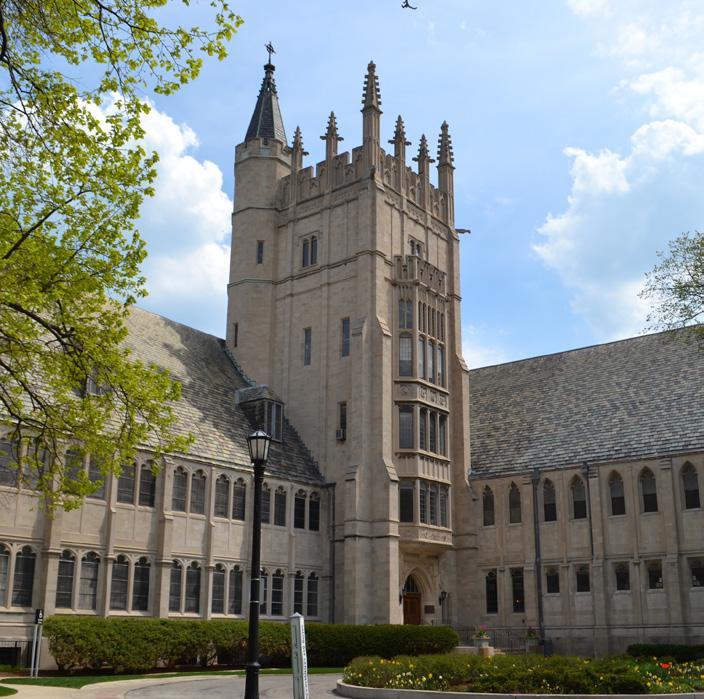
2121 Sheridan Road
Evanston, Illinois 60201

Did you know that Garrett-Evangelical Theological Seminary was founded through a bequest? Eliza Garrett, an active layperson at Clark Street Methodist Church in Chicago, recognized that Methodist preachers of her day were “equaled by none in zeal, but surpassed by many as to learning.” She was determined to correct that, and so in 1853 she wrote her will, leaving two-thirds of her estate for the founding of a seminary. Since then, many other foresighted individuals have also included the seminary in their will, helping to ensure that 170 years later the church still has leaders with both the knowledge and the vital piety needed to be effective wherever they are sent.
A bequest is perhaps the easiest and most tangible way to have a lasting impact on the people and the organizations that mean the most to you. We hope you will follow Eliza Garrett’s example and include language in your will or trust specifying a gift to the seminary so that we can continue to prepare outstanding Christian leaders well into the future.
To learn more, go to PlannedGiving.Garrett.edu and download the seminary’s Planning Your Legacy guide. When you are ready to write your will, go to FreeWill.com/Garrett and create your will for free.